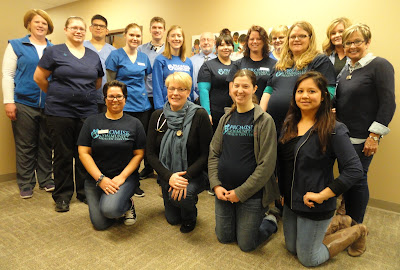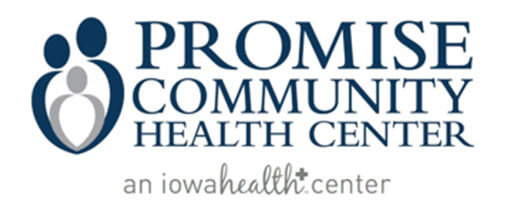07 Mar
by Derrick Vander Waal
SIOUX CENTER, IOWA – Promise Community Health Center in Sioux Center will give a $10 grocery gift card to every eligible person who completes a home stool test for colorectal cancer during National Colon Cancer Awareness Month in March.
SIOUX CENTER, IOWA – Promise Community Health Center in Sioux Center will give a $10 grocery gift card to every eligible person who completes a home stool test for colorectal cancer during National Colon Cancer Awareness Month in March.
The health center places that much importance on people being screening.
Anyone who is between the ages of 50-75 and who has not had a colonoscopy in the last 10 years or has not completed a fecal immunochemical test (FIT) in the last 12 months will be eligible to receive the gift card to Fareway or Hy-Vee. All they have to do is receive a FIT kit from Promise, complete the test and mail it back in during March.
 |
| Promise Community Health Center staff dressed up for Dress in Blue Day on Friday, March 3, to increase awareness about colorectal cancer as part of National Colon Cancer Awareness Month. Promise encourages people ages 50-75 to complete a home FIT screening to prevent or catch colorectal cancer in its early stages. |
Colorectal cancer, which is cancer of the colon or rectum, is the second leading cause of cancer deaths in the United States, according to the Centers for Disease Control and Prevention. But, it’s also one of the most preventable and treatable cancers if detected early.
That’s why Promise has signed the “80% by 2018” pledge of the National Colorectal Cancer Roundtable to regularly screen at least 80 percent of its patients ages 50 or older by 2018.
“It goes along with our focus on preventative care,” said Amy McAlpine, quality and compliance director for Promise. “We screen for a lot of different health issues at Promise. We recognize this is also an important one. We’ve found this is one that a lot of patients don’t know about. They do need to get screened if they are in that age range.”
FIT has been proven to be an effective screening tool for colorectal cancer. The noninvasive test, which is completed at home, detects hidden blood in a person’s stool. The test should be completed every year. For established Promise patients, they can call to have a FIT kit mailed to them or arrange to pick one up. For new patients, they are encouraged to schedule an appointment with one of Promise’s providers – Dr. Del Lassen or nurse practitioners Tana Kass and Beth Strub – to receive the FIT kit.
The FIT kit includes detailed instructions and materials that patients need to collect the samples and mail them back to Promise. The samples then will be tested, and if results are positive for hidden blood, a colonoscopy will be required for further investigation.
FIT is a low-cost test. Most insurance policies cover most or all of the cost. For low-income people who do not have insurance or their insurance does not cover the test, Promise’s sliding-fee scale will reduce the cost to as low as $15 depending on their household income.
To receive the $10 gift card, the samples just need to be mailed in by March 31.
McAlpine urges people to do the simple screening for colorectal cancer.
“It’s highly beatable when caught early,” she said. “Treatment is a lot more successful in the early stages.”
For more information or to receive a FIT kit, call Promise at 712-722-1700.
Promise Community Health Center of Sioux Center is the only Federally Qualified Health Center serving the far northwest corner of Iowa. Promise provides medical, prenatal, dental, vision and behavioral health services. To learn more, visit www.promisechc.org and watch this video.
AWARENESS MONTH:
March is National Colorectal Cancer Awareness Month. The awareness effort advocates for the importance of lifesaving colorectal screenings. Promise Community Health Center has signed the National Colorectal Cancer Roundtable’s “80% by 2018” pledge for screening rates among patients ages 50 or older.
WHAT IS COLORECTAL CANCER?
WHAT IS COLORECTAL CANCER?
Colorectal cancer is cancer of the colon or rectum.
Colorectal cancer is the second leading cause of cancer deaths in the United States, according to the Centers for Disease Control and Prevention. About 140,000 Americans are diagnosed with colorectal cancer every year, and more than 50,000 people die from it. Colorectal cancer affects men and women equally.
The cancer usually starts from precancerous polyps, or growths, in the colon or rectum. The colon is the large intestines, and the rectum is the passageway that connects the colon to the anus. Over time, the polyps can turn into cancer. Screening tests – ranging from a home fecal immunochemical test (FIT) to a colonoscopy – can find precancerous polyps so that they can be removed before turning into cancer. The screenings are important because they can detect polyps or cancer before people experience any symptoms.
More than 90 percent of colorectal cancers occur in people ages 50 or older, according to the CDC. Some people have higher risk factors.
To learn more about colorectal cancer, visit these resources: Centers for Disease Control and Prevention and American Cancer Society.

